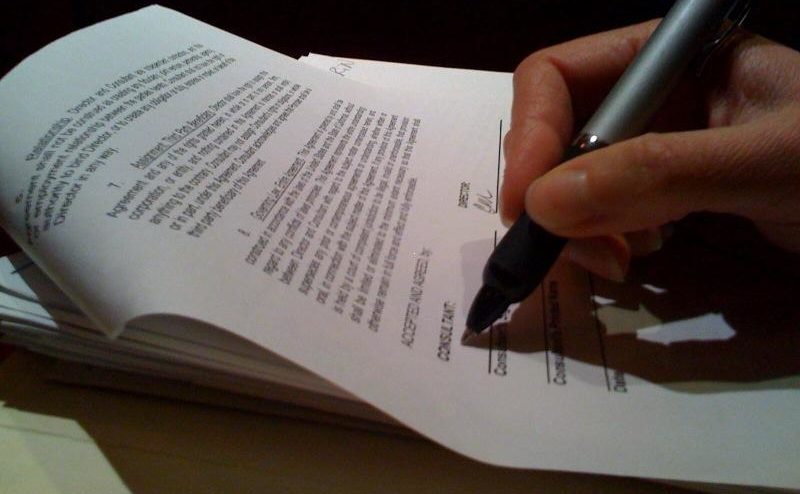
Buying and Selling the Rights to Adapt a Film
Written by Kate Fitzgerald | Posted by: erin
Before you buy or sell rights to adapt a film, you should know what you’re buying into. It’s always a good idea to look at the experiences of others for guidance.
There are plenty of stories about writers who gave up the rights to their work and, despite being paid a lot of money, loudly regretted it. Take for example, author Anne Rice’s experience when she sold the rights to Interview With The Vampire. When the lead was cast, she told the Los Angeles Times, ‘I was particularly stunned by the casting of Tom Cruise, who is no more my Vampire Lestat than Edward G. Robinson is Rhett Butler.’
At the other extreme, there’s the standard tale of the writer who sold the rights to his work for a negligible sum, while the film went on to make millions, as was the case for writer Chuck Palahniuk with his first novel Fight Club. Although Palahniuk did go on to garner fame and a tremendous boost in book sales because of the film.
While some writers are relaxed about signing off on their work, like author Jonathan Lethem with his Promiscuous Stories Project, others are militant about maintaining control over their characters and storylines. Just ask any writer in France. The French actually have a law that makes it illegal to alter a writer’s work in any way he finds unacceptable.
Things are very different here in the U.S. At writer’s conferences and workshops, you hear terms tossed around like ‘new media,’ ‘residuals,’ and ‘options.’ If you ask writers what these terms mean, you’ll likely get as many different definitions as the number of people you ask, which should definitely rule out any attempt at a do-it-yourself deal using the ‘How to Be Your Own Lawyer’ book you bought at Barnes and Noble. A lamb can make a better deal with the town butcher than a writer, without legal guidance, can make with a studio or a production company.
Understand the Breadth of Available Rights
So what exactly are film rights? Whether you are a filmmaker who wants rights to adapt a novel into a screenplay or a screenwriter/author who wants to sell rights to a filmmaker, it’s important to understand rights from both perspectives.
“Using the word ‘film,’” says entertainment attorney Jason Sloane who specializes in literary rights and partner at the Los Angeles firm of Sloane, Weber, Offer & Dern, “might create the misimpression that somehow ‘film rights’ are limited to ‘theatrical motion picture’ rights. This typically is not the case. Rather, when a producer/production company wants to acquire rights in a literary work, they will always insist on acquiring all motion picture, television and related rights to the work.”
This means any broadcast media including iPod downloads, and even related media yet to be invented. Imagine the future unfolding with hot new technology that not only showcases your work, it earns money too. But there are limitations on what you can demand. While a deal can be structured to compensate the writer for these future earnings, it’s not likely to happen unless the work is already a huge success, like a bestselling novel. A screenwriter, especially at the beginning of his or her career, is not likely to participate in future earnings, unless the screenwriter is also a producer and/or director of the film.
If you’re a screenwriter, you’ll be hired on a ‘work for hire’ basis when you’re just starting out. Most often a producer, but occasionally an actor or director, will hire you, based on your writing samples, to write an original script either from an already published story he owns the rights to, or to craft an original story from an idea he has. This means you will receive a flat fee for your script and will not receive any further compensation. Your financial interests will end, even if the film does well at the box office, and/or is turned into a television series, or a book of the film is published.
But if the film does get produced, especially if it does well at the box office, you can use the screen credit to get in the door to pitch to studios and production companies and to start selling your spec scripts, even if they never get produced. Lots of writers earn a good living just selling scripts that never make it off the producer’s shelf. But when the day comes that you do sell an original script, then you are entitled to the same copyright protections as anybody else with an original story to sell, whether it’s a novel, a script, a short story, or a non-fiction story.
Preproduction: Buying an Option
So let’s assume a filmmaker has approached you about taking an option on your original script or novel. Or that you’re a filmmaker who wants to option a script or novel. What does it mean to buy an option?
“A person who buys an option,” says Sloane, “is buying the right to purchase something on pre-agreed terms for a set period of time (the ‘option term’). During the option term, the option holder may ‘exercise’ the option by complying with the pre-negotiated terms (typically paying a purchase price). Buyers may purchase ‘options’ on anything. . . literary properties, real estate, etc. The price for the option, the length of the option term, and the purchase terms, are all subject to negotiation between the parties.”
Once both parties agree to those terms, then the clock on the option starts ticking. The clock stops when principal photography begins. When that happens, the filmmaker has ‘exercised the option.’ The filmmaker is now committed to the deal, which means the writer must be paid the full purchase price. You’ll be relieved to know that once principal photography began on Fight Club, Chuck Palahniuk got paid the full $10,000.
In putting together the financing, filmmakers often find themselves in places just as dark and lonely as writers often do. Of course, this would not include any of the writers in France who never find themselves in dark and lonely places, by law. Pitching to financial backers, hiring a writer, and actors, and coordinating the hundreds of details that go into a film production, are challenges that at any point can stop the filmmaker in her tracks. This can sometimes mean the clock on the option can run out. If the filmmaker still wants to pursue the project, then she must renegotiate the option with the writer.
Production: Rights While Shooting
Or sometimes, the project can develop critical problems once principle photography has begun. When documentary filmmaker Cheryl Eagan-Donovan, founder of Controversy Films, first picked up her camera it was to produce All Kindsa Girls, about Boston based punk singer/songwriter John Felice. Donovan had met Felice in her job as a booker for punk and hardcore rock bands. Things were going well for Eagan-Donovan until she approached the record company to get a release for the use of Felice’s music in the film. “I hit a wall,” Eagan-Donovan said. “This little record company would not agree to let me use the music because they were afraid people would not buy the record if they could buy a DVD that had the music. It was a real challenge and a learning curve for me.”
But Eagan-Donovan had had the savvy to obtain signed releases as her work progressed. “I realized I already had the rights to everything I had filmed,” she said. “I still had a film, I just didn’t have a release from the record company. So I used other music sources to complete the project.”
Eagan-Donovan, who is also a writer, says, “It’s important to have everything worked out, in writing, beforehand so there are no misunderstandings.” In her experience, she says, “It can take up to six months to work out an option agreement. Working out the rights and the legal issues, take up about 10 percent of the budget. So that’s a lot of time, and up front costs to cover.”
The Special Circumstance of Sequels
If you’re planning a sequel, you must establish your rights to use your characters in future projects with the deal you make on your first. Maybe you’ve planned a series of books, or planned to adapt a series of books. (Think of J.K. Rowling and Harry Potter. Or maybe you’re not sure what you’d like to do in the future.
According to Sloane, “The studio’s right to acquire motion picture rights to any author written sequels is typically the subject of complicated contractual provisions in the option/purchase agreement for the original novel. Authors who option their novels will reserve the right to write ‘author written sequels.’ This means the author may write an additional novel(s) with the same leading characters for literary publication. However, the studio will require various restrictions on how that author may or may not sell the motion picture rights in such author written sequels. The studio/production company will always buy the right to make sequels that are not necessarily based on additional sequel novels.”
Remember Jaws, and the endless sequels the studio made without author Peter Benchley? Not only is the author restricted in his future use of the characters he created, he is usually contractually obligated to first offer his sequel to the film company or studio who produced the first book. The reason for this is simple. The studio/production company doesn’t want the writer competing with them. How weird would it be if Tom Clancy kept on writing novels using his original character, Jack Ryan, and Paramount Pictures kept on making Jack Ryan movies, with both using separate storylines? So the restriction is understandable. Clancy gets to keep on writing Jack Ryan stories, and Paramount gets to produce them.
But there is some leeway if the work is a bestseller. Author J.K. Rowling could impose demands on the studio, including having a say in the choice of director, and even demanding that the screenplay of the first book remain exactly as written in the novel. This is because Harry Potter was then, and still is, a monster hit. This would not be the case for the mid-list author whose work suddenly piques the interest of a studio or production company. For authors who’ve probably only sold 5,000 copies (selling 100,000 copies is considered a bestseller), any production would only boost author name recognition and book sales. But that doesn’t mean they should give away their work. There could be many reasons why sales of the original work were poor, and it probably has nothing to do with the work itself, especially if a production company or studio is interested. When they come calling, it’s because they see financial value in the work.
Very often, the terms offered by studios and production companies are one-sided and seemingly unfair. The reason for this is because studios and production companies must come up with the financing to support the entire production, and then must make a distribution deal. Because there is great financial risk involved, studios not only want to limit competition from the writer, they want to avoid any interference from him as well. This could explain why writers are rarely welcome on the sets of American productions. A famous exception took place during the filming of The Color Purple when Steven Spielberg brought Alice Walker on the set because he wanted her available to consult with the actors and to write dialogue on the spot.
Considering that films would not exist without a writer to first craft a story to film, it seems reasonable for the writer to demand appropriate compensation for handing over such freedom to the filmmakers. And if the writer decides he doesn’t like the direction the work is taking, does he have any say? Says Sloane, “Not in the United States, unless specifically negotiated, which virtually never happens.”
Attorney Jason Sloane’s comments are not offered, nor are they intended, as legal advice.
For related stories, see ‘How to Make Low Budget Soundrtracks’ or ‘The Legal Side of Film.’
Attorney Jason Sloane’s comments are not offered, nor are they intended, as legal advice. For related stories, see 'How to Make Low Budget Soundrtracks' or 'The Legal Side of Film.'











